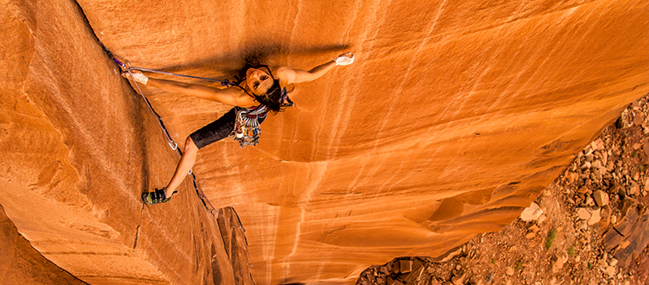Emotion and Fear
Hi Steph–
Responding to this discussion about fear.
I used to climb a lot, and soloed a bit. I think the message that fear can be mitigated with a studied, very sane approach is a good one. Journey of one thousand miles and so forth…That said, this also reminds me of the experience of soloing the first few times I did. There was a point when I stepped a little far off the ground to call it bouldering–or to go back more easily than go up–and that was terrifying. But after that the fear seemed to transfigure into something different. Very strange and narcotic in which there seemed to be no fear–not like insane courage–like a simple absence of fear and absence of thinking of the consequences. In that state it almost seemed as if I started to lose the feeling of my body working extra hard, like in roped climbing and started to just move, not even remembering my movements. In a way, this seems arrogant as hell…but in another way very humble sort of knowing that the world is so big and people really aren’t.
Later on I taught in an outdoor education experience. Sometimes they would talk about fear always being there and I would say something about there being ways to continue even in the presence of fears and I’d never be sure if that made any sense. Anyway, while I think advocating the step by step approach is a good, strong message I still have this curiosity about how the different emotional elements mix in climbing and other adventures. Wanted to respond. If you have any thoughts, I’d be interested in hearing them.
Dave
Dear Dave,
Thanks for such interesting thoughts, and I too would like to hear more from other people along these lines. I find the study of fear to be one of the most interesting things in life. I guess this is because I value freedom above everything else, and I think fear is the biggest limiter of freedom. This idea is bigger than any “sports” or adventures….you only have to look at the current events in the world to see how fear affects everything humans do and are.
What you said about continuing in the presence fear is really interesting, because it reminds me of something a BASE jumper friend told me early on, when I first started jumping cliffs. I told him that my approach to BASE was to be so methodical and gradual with my jumps that I would not actually feel fear when I jumped. Because I don’t like feeling scared. I am a very emotional person, and I learned early on in the mountains that in high-risk, fear-intensive environments, I perform best if I drive out all of my emotions. I have to erase all emotion, and become purely rational. For me, this is very different than my normal operations, for example, rock climbing with a rope, pushing difficulty rather than danger. With that sort of activity, I often rely on emotion to take me further than I might normally be able to go. So they are very different.
My goal with all risk activities has been to figure out how to eliminate fear when doing them. This is still my approach, personally, the methodical elimination of fear. But he commented to me that he is always scared BASE jumping (this is a super experienced jumper). And then he told me that if you always don’t feel afraid, you might have a hard time in that one moment when fear is there despite all of your efforts to eliminate it…..what do you do then?
His approach is, as he put it, “to work side by side with fear.” That is, the fear is there, but rather than allowing it to take front position and control everything, he allows it to exist alongside his thinking, acting self. I found that to be a really good concept. And there are definitely moments when I feel strong fear. If driving it away doesn’t work, I do use his approach, and allow it to be there, as one part of me, rather than letting it be the driver and control me into danger–because that’s what fear does. This is very similar to what you were telling your students about continuing in the presence of fear. I liked what my friend said, because it was something I could understand.
Thank you Dave, for your thoughts….
xx Steph







